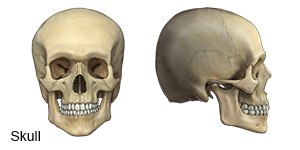Skull Fracture in Children
Medically reviewed by Drugs.com. Last updated on Aug 4, 2025.
AMBULATORY CARE:
A skull fracture
is a break in a bone in your child's head.
 |
Signs and symptoms
depend on the cause of your child's skull fracture:
- Misshapen head
- Headaches, dizziness, or jaw pain
- Nausea or vomiting
- Bulging fontanelle (soft spot) in infants
- A lump or swelling on the head
- Blood or clear fluid coming out of his or her nose or one or both of his or her ears
- Blurred or double vision
- Bruising behind the ears or around the eyes
- Increased sleepiness or confusion
Call your local emergency number (911 in the US) if:
- Your child has a seizure.
Seek care immediately if:
- Your child is suddenly dizzy and short of breath.
- Your child seems confused or more fussy, restless, or sleepier than usual.
- Your child has blood or fluid coming out of one or both ears.
- Your child is not hearing well, has slurred speech, or blurred vision.
- Your child has weakness on one side of his or her body or trouble with balance.
- One of your child's pupils is larger than the other.
Related medications
Call your child's doctor or neurologist if:
- Your child has a fever.
- Your child's headache worsens even after you give him pain medicines.
- Your child is vomiting.
- You have questions or concerns about your child's injury, treatment, or care.
Treatment
will depend on the type of fracture your child has:
- Medicines may be used to prevent or treat pain, seizures, or a bacterial infection. Your child may also need medicine to decrease fluid pressure in his or her head.
- A neck brace may need to be worn to prevent your child from moving his or her head and neck.
- Surgery may be needed correct damage to your child's skull and surrounding tissue. If he or she has a wound, surgery may be used to remove objects, dirt, or damaged tissue.
Treatment options
The following list of medications are related to or used in the treatment of this condition.
What to do if your child has a head trauma:
- Check if your child is breathing or has a pulse. Start CPR if needed. Have someone call 911 or a hospital for assistance.
- Do not move your child until there is medical help available. If your child is vomiting, turn him or her on his or her side by holding both sides of his or her head and shoulders while moving him or her. Do not allow his or her head and neck to bend, twist, or turn.
- Do not put anything into your child's mouth.
- Do not touch anything that is sticking out from his or her head.
- Apply direct pressure to your child's head if he or she is bleeding. Place another cloth on top of the first cloth if it becomes soaked with blood.
- If your child has a seizure, stay with him or her until the seizure ends. After the seizure, roll him or her onto his or her side. Do not move your child while he or she is having a seizure.
Help prevent a skull fracture:
- Always securely fasten your child in a car safety seat in the back seat.
- Do not leave your baby alone on any furniture, such as a bed or couch. Place him or her in a crib or playpen if you must leave him or her unattended.
- Do not let your child dive into a shallow pool or in water where the depth is not known.
- Make sure your child wears proper protective gear when he or she plays sports. Gear includes wrist guards, a helmet, kneepads, and a mouth guard that meet safety standards.
© Copyright Merative 2025 Information is for End User's use only and may not be sold, redistributed or otherwise used for commercial purposes.
The above information is an educational aid only. It is not intended as medical advice for individual conditions or treatments. Talk to your doctor, nurse or pharmacist before following any medical regimen to see if it is safe and effective for you.
Learn more about Skull Fracture
Treatment options
- Medications for Head Injury
- Medications for Head Injury w/ Intracranial Hemorrhage and Loss of Consciousness
- Medications for Head Injury with Intracranial Hemorrhage
- Medications for Head Injury with Loss of Consciousness
Care guides
Symptoms and treatments
Further information
Always consult your healthcare provider to ensure the information displayed on this page applies to your personal circumstances.
